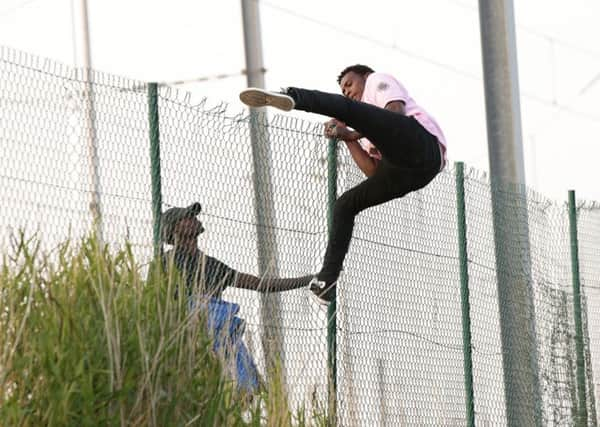Migrant crisis: The key things you need to know...


Here are some of the key questions around the crisis:
• What are the issues?
For years migrants have camped out near the port of Calais, hoping to get to Britain in search of a better life. But strikes earlier this summer by French ferry workers caused the closure of the Channel Tunnel and the situation descended into chaos, with migrants openly trying to board lorries bound for the UK as they wait to cross the Channel.
Since then many migrants have died trying to make the crossing while the Government works with the French to ramp up security at the port.
Advertisement
Hide AdAdvertisement
Hide AdDespite the tougher measures and harsher rhetoric from the likes of Prime Minister David Cameron and Foreign Secretary Philip Hammond, thousands remain in Calais, hoping to get to Britain.
• Why do they want to come to the UK in the first place?
The huge camps at Calais are part of a wider migration crisis in Europe, caused largely by a widespread displacement of people from war-torn countries such as Eritrea, Syria and Afghanistan, where people are fleeing hunger, civil war and political instability.
Many migrants are also coming from North Africa, making the dangerous journey across the Mediterranean - journeys often organised by criminal gangs and people-traffickers - to Italy.
Advertisement
Hide AdAdvertisement
Hide AdThe UK’s National Crime Agency (NCA) believes this route is the biggest threat to increased illegal immigration - use of the route rose by more than 300% in 2014 and is set to increase. Thousands have drowned so far this year trying to make the crossing.
Migrants try to get to Britain as they believe it will offer them a better life - a chance of decently paid work, education, housing and the chance to claim asylum if they fear persecution or death in their home countries.
• What is the situation doing for Anglo-French relations?
There have been tensions. Mr Cameron called the scenes at Calais which led to the Channel Tunnel being shut in June “totally unacceptable”, but said it was important to work with the French and there was “no point either side trying to point the finger of blame”.
The French, meanwhile, have pushed back, with deputy mayor of Calais Philippe Mignonet reiterating calls from French politicians for the border to be moved from northern France to Britain.
Advertisement
Hide AdAdvertisement
Hide AdMr Mignonet also branded the PM’s comments describing a “swarm” of migrants at Calais as potentially racist or extremist.
But broadly there remains co-operation from the governments on both sides of the channel, as shown by Mrs May and Mr Cazeneuve’s meeting.
• What is being done to solve it?
Britain last month committed a further £7 million to beefing up security at Calais and at the Eurotunnel railhead at Coquelles.
A new secure waiting area that can hold up to 230 lorries is just one of the measures being taken at the port.
Advertisement
Hide AdAdvertisement
Hide AdMrs May and Mr Cazeneuve will announce fresh measures aimed at improving security at the port and tackling people smugglers.
But a fresh focus on boosting humanitarian aid to migrants’ home countries is also expecting, the hope being that improved conditions will mean less people want to leave.
The Government will bring forward an Immigration Bill during this Parliament which is set to include measures to tackle the so-called “pull factors” behind migration, and will include moves to take on rogue employers that hire illegal immigrants.
• What about the wider migrant crisis?
With record numbers of migrants entering Europe, the EU continues to push for wider agreement to its migrant relocation scheme.
Advertisement
Hide AdAdvertisement
Hide AdThe Government remains opposed to the scheme, and is keener to stop the problem at source by breaking the link between travelling to Europe by boat and gaining settlement in Europe, and to smash the work of the organised gangs and people-traffickers.
A 90-strong British law enforcement task force is tackling the criminal gangs behind the migration crisis in the Mediterranean and includes officers from the NCA, Border Force, Immigration Enforcement and the Crown Prosecution Service.
The EU has also launched a naval operation against people-smugglers in the Mediterranean as part of the effort to tackle the problem.
British survey vessel HMS Enterprise has taken over from HMS Bulwark, offering improved intelligence-gathering capabilities. But while Bulwark saved thousands of migrants who may have drowned, Enterprise, a much smaller boat, has reportedly saved none.
Advertisement
Hide AdAdvertisement
Hide AdThe UK’s eavesdropping agency GCHQ is also involved in the effort, analysing information about the smuggling and trafficking gangs.
Read more...